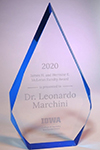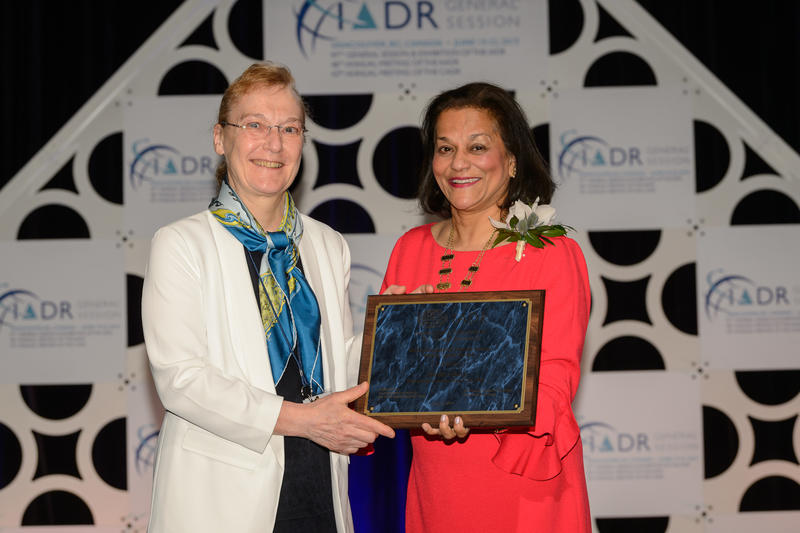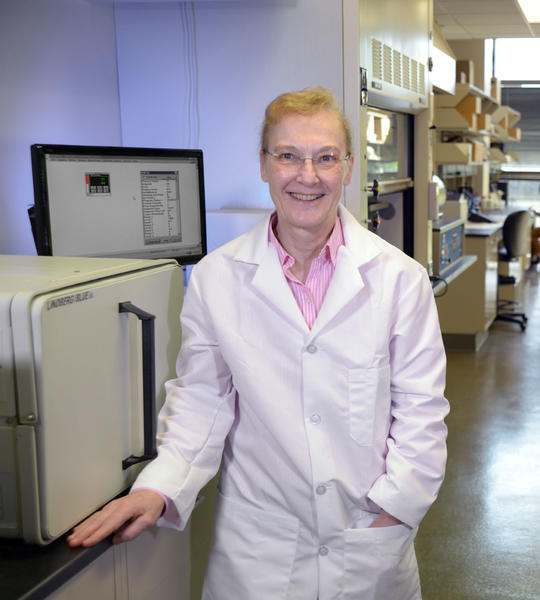
Dr. Kim Brogden to Retire from the College of Dentistry
Dec 01, 2020
After a successful 27-year career as a microbiologist and a research leader for the US Department of Agriculture, Dr. Kim Brogden became a Hawkeye. He joined the University of Iowa College of Dentistry in 2004 as a professor in the Department of Periodontics and he would later become the director of the Iowa Institute for Oral Health Research for the college.
With 45 years of experience in microbiology and immunology, Dr. Brogden is retiring from the College of Dentistry in January 2021. Over his career, he has:
- Secured large research grants, including two R01 funded projects;
- Published 186 journal articles, 74 of them since he came to Iowa, of which, 51 had student, resident, or graduate student co-authors;
- Co-authored 1 book and 17 book chapters, and was a co-editor for 4 other books;
- Obtained 4 patents or provisional patents;
- Presented 260 abstracts at local, regional, national, or international meetings and conferences,
With almost 15,000 citations over his career, Dr. Brogden has established himself as a leader in developing and testing predictive computational simulation models of immune and cancer cells and in antimicrobial properties of lipids and peptides. One particular article, for which Dr. Brogden was the sole author, was cited over 5,000 times!
Speaking of Dr. Brogden’s vast accomplishments, Dean David Johnsen said, “It is about science and about people, and Kim is a remarkable example of someone able to influence both.”
In so doing, Dr. Brogden has advanced the research mission at the College of Dentistry and he has advanced science in his areas of specialty.
Dr. Xian Jin Xie, Associate Dean for Research at the University of Iowa College of Dentistry, said of Dr. Brogden, “He has had a great scientific career, with countless accomplishments and milestones. The college will miss his expertise and leadership over the coming years.”
The progression of science, however, is not just about research; it also requires that we train the next generation of scientists. And that’s what Dr. Brogden will tell you he is most proud of in his career. One of his greatest accomplishments at the University of Iowa, he says, is that of the 74 articles he’s published during his 16 years at the University of Iowa, his students have been co-authors on 51 of them, and eight of them with four or more co-authors.
Dr. Teresa Marshall, the director of the Dental Student Research Program, speaks glowingly of Dr. Brogden’s excellence as a mentor.
“His students are well trained and function together as a team,” said Marshall, which allows them “to generate high quality research, which makes them very competitive for local and national awards,” she added.
Dr. Amber Bates and Emily Starman are two such students, among the examples of the many students passing through his lab. Bates defended her dissertation in 2018 after working in Brogden’s lab for five years, and she is now an assistant scientist in the School of Medicine & Public Health at the University of Wisconsin-Madison.
“My research on head and neck cancer in Dr. Brogden’s lab is what led me to become interested in cancer research,” Bates said.
Brogden, Bates said, “… is the type of mentor that everyone wishes they had, but are actually quite hard to find. Dr. Brogden realizes the benefits of transferrable skills and encourages his students to become effective communicators and develop a range of laboratory skills.”
Training the whole person—as a researcher, scientist, communicator, writer, and team member—is a hallmark of Brogden’s approach.
“Amber Bates is a great sign of success,” Brogden said as he beamed with pride. “Sending her on to an elite cancer research center shows what an excellent researcher she’s become.”
Emily Starman is a third-year dental student, and she began working in Dr. Brogden’s lab the summer after her first undergraduate year at Luther College and that work has continued as part of the Dental Student Research Program.
The Dental Student Research Program provides opportunities for students to learn about cutting-edge research in the oral sciences, so that they are able to draw on those research skills in a clinical setting. Most Iowa dental graduates will practice in Iowa, and this research focus ensures that our graduates have the skills to learn about and evaluate new treatments and procedures so that they can always provide the best, cutting-edge care available throughout their careers.
For Starman, Dr. Brogden’s lab has made a great difference for her.
As a result of her work with Dr. Brogden, “I began to love doing research,” she said.
Like Dr. Bates, Starman sees the great value that Dr. Brogden has had for her as a mentor.
Starman explained, “Dr. Brogden has immensely helped to develop curiosity, lab skills, and an appreciation for analyzing evidence and data.”
Going forward, Starman plans to “continue pursuing research efforts and trusting in evidence-based dentistry through my future career.”
Starman also indicated that her research has helped her develop passions in dentistry more broadly, including in public health.
Exemplifying excellence in scientific research and as a mentor, Dr. Brogden has made a great impact not only in the fields of microbiology and immunology but also in the lives of his students. The experiences of Dr. Bates and Starman are not unique—Dr. Brogden’s excellence as a mentor will leave a lasting mark on the College of Dentistry.
























 At the 2019 International Association for Dental Research (IADR) annual meeting in Vancouver, she received the Wilmer Souder Award—an IADR Distinguished Scientist Award—recognizing excellence in the field of Dental Materials.
At the 2019 International Association for Dental Research (IADR) annual meeting in Vancouver, she received the Wilmer Souder Award—an IADR Distinguished Scientist Award—recognizing excellence in the field of Dental Materials. Perhaps the best example of Dr. Denry’s exploratory approach is when she discovered a self-assembled gallo-silicate microsphere material with some unique properties. Presently, there are a number of emergency blood clotting agents, but they all have significant drawbacks. Some produce strong exothermic reactions that cause serious burns, others are made from shellfish and can cause allergic reactions, still others leave behind residue that can be harmful.
Perhaps the best example of Dr. Denry’s exploratory approach is when she discovered a self-assembled gallo-silicate microsphere material with some unique properties. Presently, there are a number of emergency blood clotting agents, but they all have significant drawbacks. Some produce strong exothermic reactions that cause serious burns, others are made from shellfish and can cause allergic reactions, still others leave behind residue that can be harmful.




